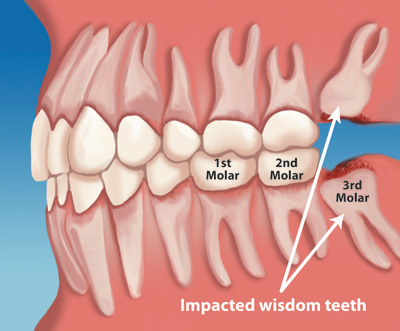The common answer is that they’re known to be called “ wisdom teeth ” because they come out so late (between 17-25 years of age) — much later than the other teeth, at an age in which people are supposed to be wiser than children – which is when all your other teeth appear. Easy isn’t it?
The actual origin of the word is more complex though.
The term Wisdom Teeth comes from a mistranslation of the Dutch word for these teeth, ‘verstandskiezen’, literally ‘far-standing-molars’, referring to the fact that they are located at the back of the mouth. In Dutch, such compound words are contracted, (written without the spaces) leaving the first part of the word as ‘verstand’ which can correctly be translated as ‘wisdom’ or ‘understanding’, in English.
While a lot of languages simply mirror the English version, there are a couple of languages where it is expressed in a different way.
For example:
Turkish refers directly to the age at which wisdom teeth appear and calls it ’20 yaş dişi’ (20th year tooth).
In Korean, its name is ‘Sa-rang-nee’ (사랑니, love teeth) referring to young adulthood and the pain of first love.
In Japanese, its name is ‘Oyashirazu’ (親知らず), literally meaning “unknown to the parents,” from the idea that they erupt after a child has moved away.
The Indonesian term ‘gigi bungsu’ refers to bungsu, meaning “youngest child”, because the teeth erupt so much later than the others, implying that the teeth are “younger” than the rest.
In Thailand, the wisdom tooth is described as ‘fan-khut’ (ฟันคุด) or “huddling tooth,” due to the shortage of space for each one.
There are many complications that can happen with your wisdom teeth. If you are lucky you will feel no pain at all, and might not even develop them. Removing these teeth surgically is common nowadays, since we don’t need them and the pain they cause can stop us from being able to eat .
But why do we still have Wisdom Teeth?
Anthropologists believe wisdom teeth were evolution due to ancestor’s early diet of coarse, rough food – like leaves, roots, nuts and meats – which required more chewing power and resulted in excessive wear of the teeth. The modern diet with its softer foods, along with marvels of modern technologies such as forks, spoons and knives, has made the need for wisdom teeth non-existent.
The jaws of our ancestors were much bigger, could accommodate all the teeth and were needed in chewing. It is more of a vestigial tooth now as the jaw size decreased. It usually erupts with a risk of being impacted or erupting in different directions hampering the position of other teeth.
Some people have all 4 wisdom teeth, while others may only have a few – or none at all! Wisdom teeth may come in straight, not causing any problems with the other teeth. In this case, they do not need to be removed. However, they are usually removed anyway to prevent the occurrence of decay between the wisdom tooth and the molar beside it- as it is difficult to clean properly. Impacted wisdom teeth should be removed because they pose a risk for infections such as pericoronitis, which occurs when bacteria and plaque build-up get into the gum flap covering the wisdom tooth and cause an abscess. An abscess can be extremely painful and dangerous, so it is important to call your dentist if you experience any pain due to the eruption of your wisdom teeth. Wisdom teeth are also removed if x-rays show that their development is detrimental to the organization or health of the other teeth.






